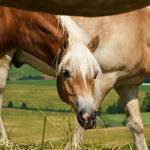Grass Sickness in Horses: Degree of Weight Loss and Survival

Horses suffering from equine grass sickness (EGS) present with colic, constipation, and swift, severe weight loss. The underlying cause is damage to the nervous system, especially nerves supplying the gastrointestinal tract. Most rapid-onset, severe cases are fatal, frequently resulting in loss of life within two or three days, but some horses manage to bounce back after a bout of EGS.
There are currently no objective criteria available to help predict survival of horses with EGS, reported a group of veterinarians from the Royal (Dick) School of Veterinary Studies and the Roslin Institute in the United Kingdom.*
“Accurate prediction of outcome would have welfare and economic benefits, because it could reduce the number of potential survivors subjected to euthanasia and the number of nonsurvivors that are given unsuccessful intensive nursing prior to euthanasia,” they wrote in a study on the topic.
Because weight loss is a prominent feature of EGS, the research group hypothesized that magnitude or rate of change in body weight could predict which hospitalized horses with chronic EGS would survive until discharge.
Of the 213 horses treated for chronic EGS between 1998 and 2013, 114 (53%) survived. As suspected by the veterinary research team, both the rate and magnitude of weight loss during hospitalization were equally predictive of survival, with nonsurvivors experiencing faster, more pronounced weight loss.
“This study also led to the development of weight loss charts to predict survival,” added Kathleen Crandell, Ph.D., a Kentucky Equine Research nutritionist.
She added, “Those charts, although early in development, can help ambulatory veterinarians. They can use a weigh tape and track their patients’ weight loss to help determine whether a horse is likely to survive chronic EGS when treated on the farm.”
EGS is a common condition in Great Britain, Scotland, Wales, and northern European countries, but cases have been reported in North America and other countries. Researchers believe the underlying cause involves a change in diet resulting in the overgrowth of Clostridium botulinum type C, a normal inhabitant of a horse’s gastrointestinal microbiome.
That bacterium produces a potent neurotoxin, resulting in damage to the nerves supplying the gastrointestinal tract. Diagnosis is based on clinical signs, as there is no test for EGS in living horses, and treatment for severe acute and subacute cases is not recommended due to the invariably fatal outcome. Potential ways to avoid EGS are to minimize exposure to pastures where previous cases have occurred, avoid overgrazing of fields, and maintain a constant diet with no abrupt nutritional changes.
*Jago, R.C., I. Handel, C.N. Hahn, et al. Bodyweight change aids prediction of survival in chronic equine grass sickness. Equine Veterinary Journal. In press.








